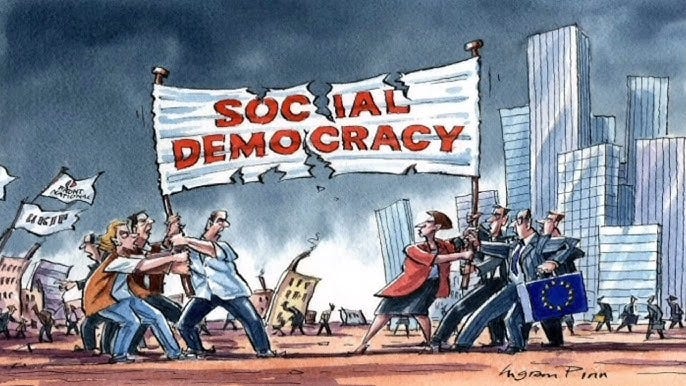Social Democracy is a political ideology that, originally, advocated for the transition from capitalism to socialism. However, given the radical nature of this idea, during the latter half of the 20th century, the ideology was reformed to be more moderate. (It should be mentioned that Social Democracy and Democratic Socialism have very similar views, however, they differ on how the economy is supposed to be structured. For more on Democratic Socialism, check it out here.)
The difference?
Well, the focus was shifted from the strong Marxist sentiment of state-owned property to state-regulated property. Furthermore, those who would advocate for a social democracy generally believe in the importance of having a strong welfare state (i.e. healthcare, housing, and income support).
History of Social Democracy
The history of social democracy can be traced back to 19th-century, post-revolutionary Russia. The term was used by ideologically varied socialists at the time of the labor movement, typically by those who were opposed to authoritarian forms of socialism.
Marxist theorist Eduard Bernstein is largely considered the father of social democracy due to his critique of Karl Marx’s implementation of Marxism. Bernstein argued that, rather than revolution, the gradual reformation of democratic institutions would be best suited to developing a socialist society. During this time, social democrats embraced economies that had a majority of private property with a keen focus on regulating capitalism.
However, since the advent of the 21st century, social democracy is most closely associated with Keynesian economics and the welfare state.
The Anatomy of Modern Social Democracy
An economist by the name of John Maynard Keynes would be the one who would help shape what modern social democracy looks like today, particularly in the West. Keynes’ most important work, The General Theory of Employment, Interest, and Money, advocated that a remedy for an economic recession is an increase in government fiscal stimulus. The United States would create this stimulus through the inception of its welfare state. Furthermore, the U.S. government, during the Great Depression, would follow Keynes’ fiscal policies as guides for government intervention. However, the U.S. would only dip its toe in the socially democratic pool during this time, leaving plenty of social democratic policies on the table.
Welfare System: What is the most crucial aspect of a successful social democracy is the effectiveness of the welfare state. A successful welfare state is centered around the Egalitarian idea of equality of opportunity for its citizens, more specifically, in the distribution of economic and social equity. This equity is intended to provide the minimal provision for what is a “good life.” These provisions may come in the form of state-subsidized healthcare, housing, education, and income support.
Politically Democratic System: Looking at the Nordic Model, the political model followed by the “Nordic” countries in Northern Europe, the political system of a social democracy encourages deliberative consensus between multiple parties. Conversely to the United States, these social democracies encourage consensus-driven law-making processes, rather than adversarial ones. According to Freedom House’s Freedom in the World report, which measures the freedoms and rights citizens receive in a given country, shows that these socially democratic countries score the highest among all countries with perfect to near perfect scores.
International Cooperation: Social democracies prioritize the rights and well-being of their citizens, allowing a healthy political culture to flourish within their society. Similarly, social democracies are also committed to advocating for human and labor rights abroad. Social democracies take action through international organizations such as the United Nations, the European Union, and the World Trade Organization.
What is the Future of Social Democracy?
The implementation of social democracy in already existing democratic countries continues to be a rare occasion globally. Though still largely scrutinized as being a tool for communism, individuals may still worry that social democracy’s deliberative structure will make law-making slow and citizens will become overly dependent on welfare. However, as more people become frustrated by the downsides of capitalism, the appeal for alternatives may paint an optimistic picture for social democrats looking to the future.


